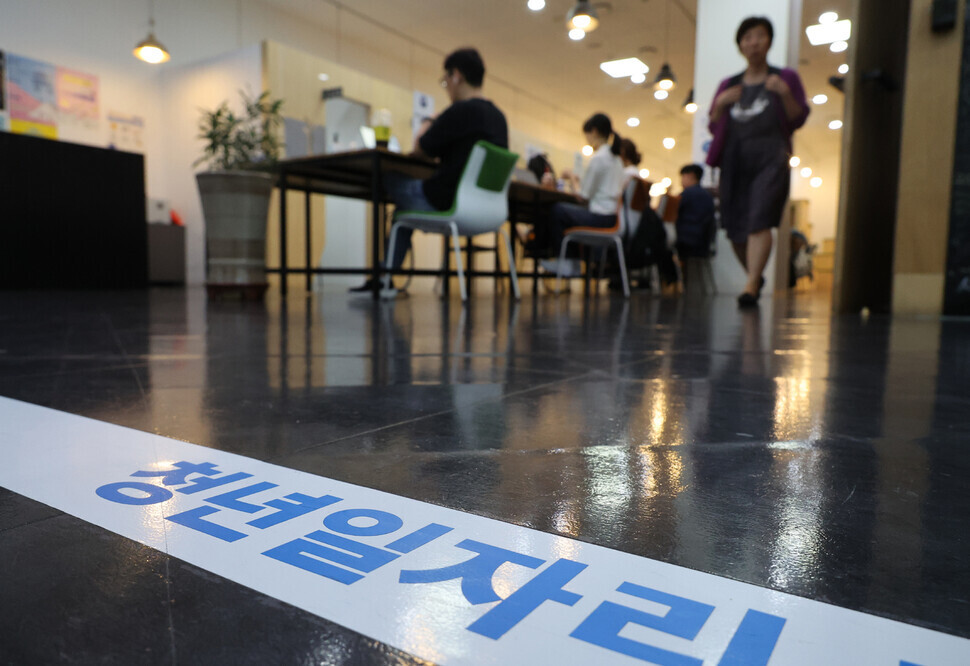Young Americans Ditching Workforce: A Worrying Trend

A view of the Seoul Youth Work Center. Yonhap News
A new report paints a concerning picture of young adults disengaging from the workforce.
According to a recent study from the Bank of Korea, a growing number of Americans aged 25 to 34 are stepping away from the labor market altogether. This trend is alarming experts who fear these individuals may become permanently detached from the workforce.
The study revealed that the number of young people taking this sort of "break" jumped by a staggering 25.4% in just one year – from 336,000 to 422,000. "It’s not that they haven’t entered the labor market in the first place, but there has been an increase in the number of people with employment experience who are no longer looking for work and are leaving the workforce," Lee Soo-min, head of the Bank of Korea’s research bureau, explained.
This trend is especially pronounced among young adults who have already worked. They’re choosing to step back, even voluntarily, citing a lack of suitable job opportunities matching their skills and aspirations.
Creating a labor market disconnect, this
The phenomenon raises serious concerns about the future US workforce. "The increase in unemployment among young people is a factor that will worsen labor supply in the future, so policy efforts are needed to bring them back into the labor market," the report warned.
Experts believe a confluence of factors is driving this trend. The report highlights a mismatch between available jobs and the qualifications of young workers.
"The mismatch phenomenon, where there are not enough quality jobs that meet their expectations, acts as a key factor in people leaving young people voluntarily enter the labor market," Lee added.
This points to a larger issue: the quality of jobs available to young Americans. Many are finding themselves trapped in low-wage, unstable positions, lacking growth opportunities or benefits.
The Bank of Korea’s findings carry significant implications for the U.S. As young Americans increasingly choose to opt out of the workforce, it could lead to a long-term skills shortage and potentially stifle economic growth.
It’s a challenge that requires a multi-pronged solution, focusing on creating more opportunities for young people to develop their skills, gain meaningful work experience, and access pathways to well-paying, stable employment.
Image: A view of the Seoul Youth Work Center. Yonhap News
2024-12-02 07:29:00
#Young #people #break #rises #year.. #High #proportion #people #employment #experience
## “Young Americans Ditching Workforce: A worrying Trend”
**An Expert Interview with Dr. Emily Carter**
**World Today News Exclusive**
**[Start audio]**
**Host:** Welcome back to World Today News. As job markets tighten and the global economy faces uncertainty, we’re seeing a concerning trend emerging: young Americans are choosing to leave the workforce at an alarming rate.
To understand this phenomenon, we’re joined today by Dr. Emily carter, a leading sociologist specializing in workforce trends and youth employment. Dr. Carter, thank you for being with us.
**Dr. Carter:** Thank you for having me.
**Host:** Dr. Carter, we’re seeing headlines about “quiet quitting,” “the great resignation,” and now this new trend of young Americans seemingly opting out of the customary workforce altogether. WhatS driving this?
**Dr. Carter:** There are several factors at play. Firstly,we can’t ignore the lasting impact of the pandemic.
Many young adults experienced economic instability and burnout, leading to a reevaluation of their priorities.
Secondly, the cost of living is soaring, making it exceptionally difficult for young people to achieve financial independence. Skyrocketing rent, student loan debt, and stagnant wages are pushing many to question if the traditional path of working a 9-to-5 is worth the struggle.
**Host:** You mentioned “reevaluation of priorities.” could you elaborate on that?
**Dr. Carter:** absolutely. Millennials and Gen Z have grown up in a world vastly different from previous generations. They prioritize work-life balance, mental health, and pursuing their passions more then their predecessors.The traditional image of climbing the corporate ladder and working until retirement doesn’t hold the same appeal for them.
**Host:** So, are these young people simply choosing unemployment, or are they finding choice ways to earn a living?
**Dr. Carter:** It’s a bit of both. Some individuals are opting for a simpler life with less financial pressure, perhaps choosing to live off-grid or pursue self-sufficiency. Others are turning to the gig economy, freelancing, or starting their own businesses. The rise of online platforms has made these alternatives more accessible.
**Host:** Is this trend worrying for the long-term health of the economy?
**Dr. Carter:** There are definitely concerns.
While some alternative economic models can be beneficial, a large-scale withdrawal from the traditional workforce could lead to labor shortages, slow economic growth, and strain the social safety net.
It’s crucial for policymakers and businesses to adapt to the changing needs and expectations of young workers. Offering remote work options, prioritizing mental health support, and addressing the rising cost of living are just a few things that could help stem this tide.
**Host:** Dr. Carter, thank you for sharing your insights on this complex issue.
**dr. Carter:** My pleasure.
**Host:** For World Today News, this is [Host Name].
**[End Audio]**


